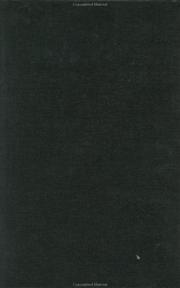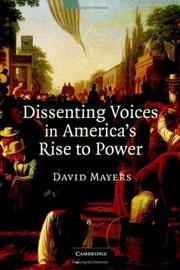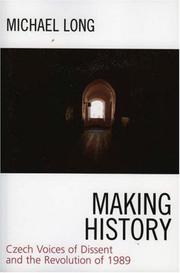| Listing 1 - 10 of 181 | << page >> |
Sort by
|

ISBN: 1280168455 0203975995 9780203975992 9780415069519 0415069513 0415069513 9781280168451 9781134914470 9781134914517 9781134914524 9780415865418 Year: 1992 Publisher: London New York Routledge
Abstract | Keywords | Export | Availability | Bookmark
 Loading...
Loading...Choose an application
- Reference Manager
- EndNote
- RefWorks (Direct export to RefWorks)
Vasily Rudich examines dissidence under Nero from both historical and psychological perspectives and inquires into the balance of the universal and historically conditioned components of political behaviour. The careers of numerous dissident individuals and their attempts at accommodation to a hostile reality are discussed.
Dissenters --- Dissidents --- Nonconformists --- Rebels (Social psychology) --- Conformity --- Rome --- Politics and government
Book
ISBN: 1441154752 1501300466 144113221X 9781441132215 9781441154750 9781501300462 Year: 2011 Publisher: New York : Continuum International Pub. Group,
Abstract | Keywords | Export | Availability | Bookmark
 Loading...
Loading...Choose an application
- Reference Manager
- EndNote
- RefWorks (Direct export to RefWorks)
This collection of papers examines the current rise in violence by Dissident Irish Republicans and its impact on the Northern Ireland Peace Process.
Dissenters --- Dissidents --- Nonconformists --- Rebels (Social psychology) --- Conformity --- Northern Ireland --- Politics and government

ISBN: 9780511805301 9780521872553 9780521694186 9780511270444 0511270445 0511267274 9780511267277 0511270704 9780511270703 0511269889 9780511269882 0511805306 0521694183 0521872553 9780511268557 1107172136 1280750774 9786610750771 0511268556 051132068X 0511269226 Year: 2007 Publisher: Cambridge Cambridge University Press
Abstract | Keywords | Export | Availability | Bookmark
 Loading...
Loading...Choose an application
- Reference Manager
- EndNote
- RefWorks (Direct export to RefWorks)
This book offers a major rereading of US foreign policy from Thomas Jefferson's purchase of Louisiana expanse to the Korean War. This period of one hundred and fifty years saw the expansion of the United States from fragile republic to transcontinental giant. David Mayers explores the dissenting voices which accompanied this dramatic ascent, focusing on dissenters within the political and military establishment and on the recurrent patterns of dissent that have transcended particular policies and crises. The most stubborn of these sprang from anxiety over the material and political costs of empire while other strands of dissent have been rooted in ideas of exigent justice, realpolitik, and moral duties existing beyond borders. Such dissent is evident again in the contemporary world when the US occupies the position of preeminent global power. Professor Mayers's study reminds us that America's path to power was not as straightforward as it might now seem.
Dissenters --- Dissidents --- Nonconformists --- Rebels (Social psychology) --- Conformity --- History. --- United States --- Foreign relations. --- Arts and Humanities --- History
Book
ISBN: 0813562031 9780813562032 9780813562025 0813562023 9780813562018 0813562015 132214964X Year: 2014 Publisher: New Brunswick, NJ : Rutgers University Press,
Abstract | Keywords | Export | Availability | Bookmark
 Loading...
Loading...Choose an application
- Reference Manager
- EndNote
- RefWorks (Direct export to RefWorks)
The Olympics have developed into the world's premier sporting event. They are simultaneously a competitive exhibition and a grand display of cooperation that bring together global cultures on ski slopes, shooting ranges, swimming pools, and track ovals. Given their scale in the modern era, the Games are a useful window for better comprehending larger cultural, social, and historical processes, argues Jules Boykoff, an academic social scientist and a former Olympic athlete. In Activism and the Olympics, Boykoff provides a critical overview of the Olympic industry and its political opponents in the modern era. After presenting a brief history of Olympic activism, he turns his attention to on-the-ground activism through the lens of the Vancouver 2010 Winter Olympics and the 2012 Summer Olympics in London. Here we see how anti-Olympic activists deploy a range of approaches to challenge the Olympic machine, from direct action and the seizure of public space to humor-based and online tactics. Drawing on primary evidence from myriad personal interviews with activists, journalists, civil libertarians, and Olympics organizers, Boykoff angles in on the Games from numerous vantages and viewpoints. Although modern Olympic authorities have strived-even through the Cold War era-to appear apolitical, Boykoff notes, the Games have always been the site of hotly contested political actions and competing interests. During the last thirty years, as the Olympics became an economic juggernaut, they also generated numerous reactions from groups that have sought to challenge the event's triumphalism and pageantry. The 21st century has seen an increased level of activism across the world, from the Occupy Movement in the United States to the Arab Spring in the Middle East. What does this spike in dissent mean for Olympic activists as they prepare for future Games?
Olympics --- Dissenters. --- Dissidents --- Nonconformists --- Rebels (Social psychology) --- Conformity --- Games, Olympic --- Olympic games --- Summer Olympics --- Sports --- Political aspects. --- Social aspects. --- IOC.

ISBN: 1461639913 9781461639916 0742536505 9780742536500 0742536513 9780742536517 Year: 2005 Publisher: Lanham Rowman & Littlefield Publishers
Abstract | Keywords | Export | Availability | Bookmark
 Loading...
Loading...Choose an application
- Reference Manager
- EndNote
- RefWorks (Direct export to RefWorks)
Making History: Czech Voices of Dissent and the Revolution of 1989 brings together the personal narratives of eleven former dissidents who, though close associates of Václav Havel, operated without his international celebrity. The narratives, based on interviews conducted by the author in Prague and Berlin, relate each individual's personal experiences on topics such as growing up in Czechoslovakia, life as a dissident, the Velvet Revolution, and the achievements and failures of the Czech Republic since 1989.
Dissenters --- Dissidents --- Nonconformists --- Rebels (Social psychology) --- Conformity --- Czechoslovakia --- Politics and government --- Interviews. --- Interviews --- Tchécoslovaquie --- Politique et gouvernement
Book
ISBN: 1893638820 9781893638839 1893638839 9781893638846 1893638847 9781893638822 9781893638815 Year: 2019 Publisher: Oak Park, MI : Mehring Books,
Abstract | Keywords | Export | Availability | Bookmark
 Loading...
Loading...Choose an application
- Reference Manager
- EndNote
- RefWorks (Direct export to RefWorks)
Rogovin traces the inner-party struggles of 1928-1933, utilizing official documents; speeches and articles of the time; Soviet archival material; memoirs of participants in contemporary political life; and documents by oppositionists in various groups that were unknown to Soviet readers for many decades.
Individual and Groups Rights --- Communism --- Socialism --- Political dissidents --- Stalin, Joseph, --- Union of Soviet Socialist Republics (Historical Place)
Book
ISBN: 9782810704231 2810704236 281070936X Year: 2016 Publisher: Toulouse: PUM,
Abstract | Keywords | Export | Availability | Bookmark
 Loading...
Loading...Choose an application
- Reference Manager
- EndNote
- RefWorks (Direct export to RefWorks)
Cet ouvrage est le résultat de la première rencontre organisée à l’initiative du Collectif international de recherche sur le catharisme et les dissidences (CIRCAED) dont l’objectif était de mettre à l’épreuve la pertinence même du programme intellectuel de l’association : promouvoir des recherches sur le catharisme et les dissidences. Tout le défi est dans ce «et» : articuler le registre historiographique bien balisé des études sur les «hérésies» dans l’espace chrétien, de l’Antiquité à la Réforme, avec une réflexion plus large et plus contemporaine sur les formes particulières d’opposition politique ou d’objection de conscience qui, dans les pays totalitaires, ont été désignées comme le fait de dissidents. La première partie de l’ouvrage porte sur les dissidences religieuses dans le monde chrétien : les études émanent majoritairement d’historiens travaillant sur chacune des quatre périodes traditionnelles. Dans la deuxième partie, les contributions d’une philosophe, d’un anthropologue et d’une spécialiste de l’oeuvre de Simone Weil éclairent, pour mieux la préciser, la notion de dissidence comme posture d’opposition singulière.
Dissidents (religion) --- Hérésies chrétiennes --- Histoire --- Dissenters, Religious --- Christian heresies --- Dissenters --- Albigenses --- Government, Resistance to --- Religion and politics --- Dissidents (Religion) --- Dissidents --- Cathares --- Résistance au gouvernement --- Religion et politique --- History --- Congresses --- Congresses. --- Congrès --- Hérésies chrétiennes --- Résistance au gouvernement --- Congrès --- Religion --- dissidence --- christianisme --- religion --- politique
Book
ISBN: 146191938X 1438445148 9781461919384 9781438445144 9781438445120 1438445121 9781438445137 143844513X Year: 2012 Publisher: Albany : State University of New York Press,
Abstract | Keywords | Export | Availability | Bookmark
 Loading...
Loading...Choose an application
- Reference Manager
- EndNote
- RefWorks (Direct export to RefWorks)
Two Sides of a Barricade argues that to construct global democracy, conflict and dissent must be taken seriously. Christian Scholl explores the political significance of the confrontations within four sites of interaction: bodies, space, communication, and law. Each site of struggle provides a different entry point to understand the influence of protester and police tactics on each other. At the same time, the four sites of struggle allow a comprehensive analysis of how the contestation of global hegemonic forces during summit protests trigger a preemptive shift in social control through increased deployment of biopolitical forms of power.
Christian Scholl is Lecturer in Political Science at the University of Amsterdam in the Netherlands. He is the coauthor (with Amory Starr and Luis Fernandez) of Shutting Down the Streets: Political Violence and Social Control in the Global Era.
Dissenters --- Opposition (Political science) --- Protest movements --- Social movements --- Movements, Social --- Social history --- Social psychology --- Political opposition --- Political science --- Divided government --- Dissidents --- Nonconformists --- Rebels (Social psychology) --- Conformity --- History
Book
ISBN: 1317085159 1317085140 1472412958 9781472412959 9781472412942 9781472412966 147241294X 9781315599069 9781317085133 9781317085140 9781138251229 1315599066 9781317085157 Year: 2013 Publisher: Farnham, Surrey
Abstract | Keywords | Export | Availability | Bookmark
 Loading...
Loading...Choose an application
- Reference Manager
- EndNote
- RefWorks (Direct export to RefWorks)
Ordinary in Brighton? offers the first large scale examination of the impact of the UK equalities legislation on lesbian, gay, bi- and trans (LGBT) people themselves and the effects of these changes on the nature of LGBT political activism. Using the participatory research project, Count Me In Too, this book investigates the material issues of social/spatial injustice that were pertinent for some, but not all, LGBT people, and activisms that worked with/within through partnership working. Despite the common trope that there is much written about 'gay Brighton', there is in fact very little aca
Sexual minorities --- Gender minorities --- GLBT people --- GLBTQ people --- Lesbigay people --- LBG people --- LGBT people --- LGBTQ people --- Non-heterosexual people --- Non-heterosexuals --- Sexual dissidents --- Minorities --- Social conditions. --- Government policy
Book
ISBN: 0773550844 9780773550841 9780773550858 0773550852 9780773550704 0773550704 Year: 2017 Publisher: Montreal Kingston London Chicago
Abstract | Keywords | Export | Availability | Bookmark
 Loading...
Loading...Choose an application
- Reference Manager
- EndNote
- RefWorks (Direct export to RefWorks)
"Frances Kelsey was a quiet Canadian doctor and scientist who stood up to a huge pharmaceutical company wanting to market a new drug--Thalidomide--and prevented an American tragedy. The nature writer Rachel Carson identified an emerging environmental disaster and pulled the fire alarm. Dissenting juries can and do change the law. They did that when they refused to convict Dr. Henry Morgentaler of performing illegal abortions when he had done just that. Judicial dissents sometimes point to a different and more just future. Occasionally dissenting judges save lives, or at least try to: that's what happened when a wrongfully convicted teenage boy named Steven Truscott got the chance to tell his story before Canada's Supreme Court. It is, or should be, all about the evidence. And destroying the evidence is exactly what happened in Canada over the course of a dark decade when the recent Conservative government did everything it could to ensure that voices that might have informed public policy were silenced. Occupy Wall Street was the first truly international protest. Who were the occupiers and what did they want? Another growing international protest movement is BDS: Boycott, Divest, Sanction. It is directed at Israel. In October 1973 Israel came close to defeat when Egyptian and Syrian forces massed on the borders and overconfident Israeli officials did virtually nothing. Forty-five years later Israel's leaders seem woefully blind to another unfolding national security threat. Our world has been saved by dissenters: people who have been attacked, bullied, ostracized, jailed, and sometimes, when all is over, celebrated. Some dissenters have truly important things to say. Listen--and decide--before you shut them out."--
Dissenters. --- Social change. --- Change, Social --- Cultural change --- Cultural transformation --- Societal change --- Socio-cultural change --- Social history --- Social evolution --- Dissidents --- Nonconformists --- Rebels (Social psychology) --- Conformity
| Listing 1 - 10 of 181 | << page >> |
Sort by
|

 Search
Search Feedback
Feedback About UniCat
About UniCat  Help
Help News
News